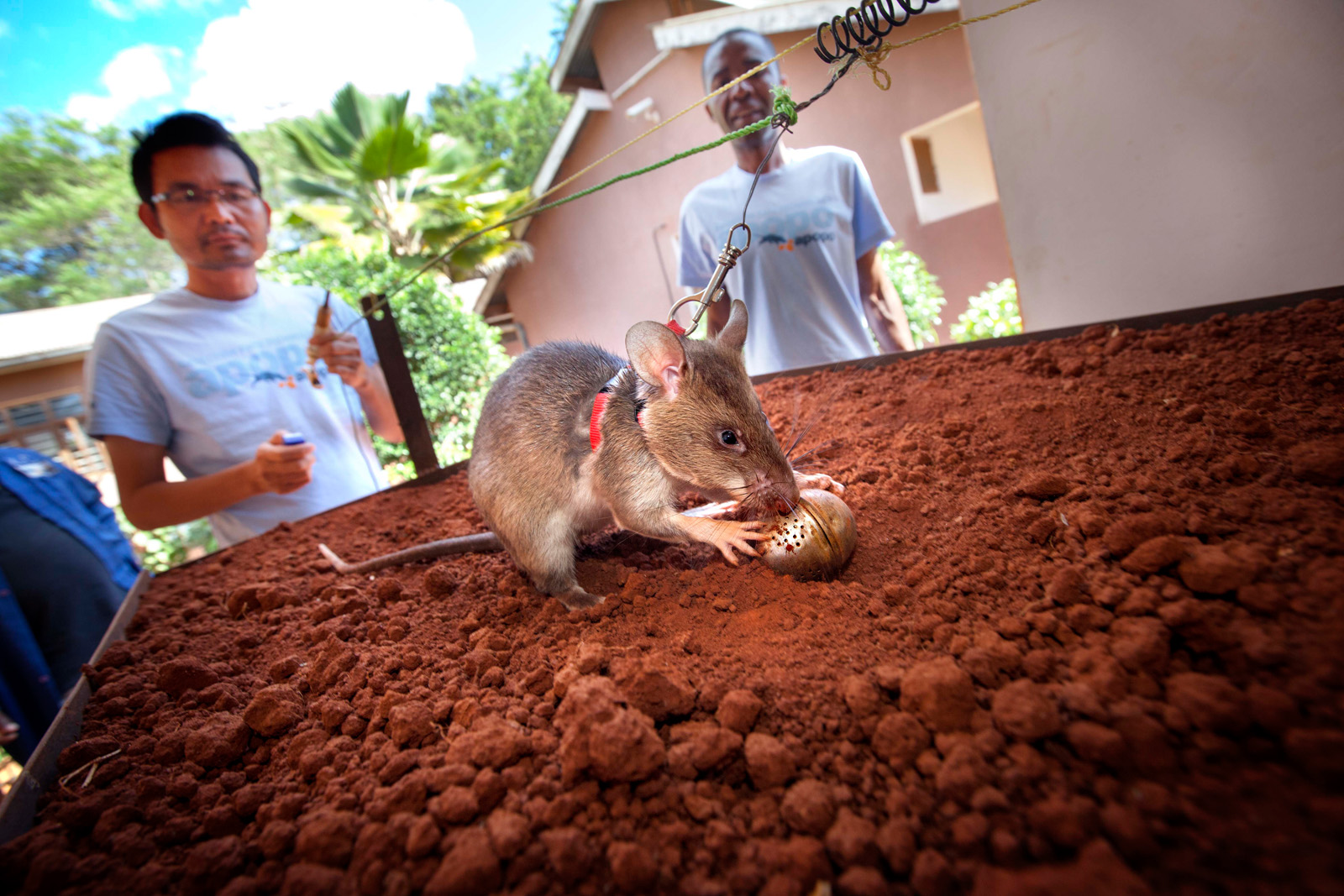UCLA alum oversees lab rats saving lives in sub-Saharan Africa

Cindy Fast, a UCLA alumna and researcher in Tanzania, trains rats to detect landmines and tuberculosis by teaching them to associate the smell of TNT or tuberculosis-positive mucus with a clicking noise that signals a food reward. (Anti-Personnel Landmines Detection Product Development)
By Emi Nakahara
Jan. 26, 2017 11:59 p.m.
The young rats Cindy Fast handles as part of her research job in Tanzania have taken a liking to her necklace. The furry rodents nibble on the necklace as she inspects them to make sure they are healthy, happy and ready for training.
“The days where I get to directly interact with the rats are some of my most joyful moments,” Fast said. “They’re very friendly, curious and cute.”
Fast, who received her doctorate in psychology at UCLA in 2014, oversees the rat-training program for the Anti-Personnel Landmines Detection Product Development, or APOPO, in its headquarters in Tanzania.
APOPO uses African giant pouched rats to detect land mines and tuberculosis because they have a sensitive sense of smell, according to its website. Rats can detect landmines without risk because they are too light to activate them. They can also evaluate 40 mucus samples for tuberculosis in seven minutes, which would take a physician an entire day.
Fast observes the rats’ development over their nine months of training, beginning with socializing newly weaned rats to the environment of the research and training facilities. Then, trainers teach rats to associate a clicking noise with a reward of food. The rats smell samples of either TNT or tuberculosis-positive mucus, and learn to associate the smell with the click. The rats are then trained to detect TNT in capsules in a field, or tuberculosis-infected mucus under sniffing holes in a cage.
Fast said her favorite part of training is seeing the rats’ love for reward treats. Rats dig up the TNT samples buried in the field and fetch it back to the trainer repeatedly for their reward.
Fast also interacts with locally employed trainers every day to solve issues throughout the rat-training process. Although she said there is a language barrier, she tries to improve her Swahili each day to overcome it.
For example, Fast said there are times where the rats gain weight from their enriched diet and want to sleep during training. In response, she and the trainers must change their diet to prevent the rats’ excessive weight gain.
“I find the interactions (with the trainers) to be very rewarding,” Fast said. “The staff has been incredibly welcoming and supportive.”
She also leads in APOPO’s research program, where she studies exactly how sensitive the rats’ sense of smell is. Fast is finding other ways the rats could be useful, such as detecting illegally trafficked wildlife or other chronic diseases, such as Alzheimer’s disease.
Fast said that though she enjoys the research and the rural setting of Morogoro, Tanzania, often poses obstacles. For instance, the power once cut out in the middle of an experiment.
“When you’re working in sub-Saharan Africa, Murphy’s Law reigns,” Fast said. “Everything that could go wrong, goes wrong. There are lots of opportunities for frustration, but the rats themselves are really great to work with.”
Fast also recently spearheaded the formation of the Research and Development Scientific Advisory Committee in APOPO, to create a more multifaceted research group for studying rats.
In graduate school, Fast investigated animal behaviors and wrote her doctoral dissertation on the psychology of rats.
“She was always passionate about animal welfare and their well-being, which was great,” said Aaron Blaisdell, Fast’s doctorate mentor and psychology professor. “The more content and at ease the animal is in the study, the better the data.”
Fast said her experience with rat behaviors at UCLA has helped her become familiar with rats’ behavior and distinguish whether a rat has not learned or simply lacks motivation.
Fast decided to study rats because she has been fascinated with animals since she was a child. In her rural home in Michigan, she named wild ducks in her backyard and observed her neighbors’ horses. She has also had five pet rats in the past.
“I took it upon myself to get closer to feed the ducks, and I was also horse-crazy as a child,” Fast said. “And rats are just fun to be around, sociable and quick learners.”
When Fast read about rats detecting landmines in a journal article, she said she thought it was amazing that all the principles in her lab were being applied to real life.
“This was my dream job, and the job description was me,” Fast said.


